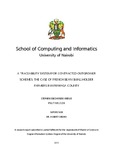A traceability system for contracted outgrower schemes: the case of french bean smallholder farmers in Kirinyaga county
Abstract
Many African countries have moved into the production of non-traditional agricultural
products, in an effort to diversify their exports and increase foreign currency earnings.
However, in order to access developed country markets and urban domestic markets, these
products must meet food safety requirements, including protocols relating to pesticide
residues, field and pack house operations, and traceability. Faced with stringent food safety
requirements, companies that establish production centres in low-income countries might
exclude smallholder farmers. For instance, export demand for Kenyan French bean recently
dropped suddenly by 25 per cent when the World Trade Organization put Kenya on the
watch list due to high pesticide residue levels. Due to this, exporters stopped buying from
about 50,000 smallholder farmers.
This research proposed a mobile-phone based traceability system to make it easier for
exporters to work with smallholder farmers in outgrower schemes to enable better quality
control and avoid such disruptions in future. To do this, a pre study was conducted as a part
of an exploratory study in order to understand the main issues of the overall traceability
concept and the specifics of pesticide residue excesses detected in Kenyan fresh produce to
the European Union (EU). From these findings, early requirements were derived and an initial
functional prototype derived using Object Oriented Design (OOD) methodology. The Unified
Modelling Language (UML) which is an object oriented language for specifying, visualising,
constructing, and documenting the artefacts of software systems was used to develop a
requirements model. After validation of the requirements, an end-to-end prototype
application system that traces all the farming activities by using a mobile application to
capture the information of farming operations was developed. The mobile application was
deployed to six farmers from two different farmers’ French bean grower groups in Kirinyaga.
They were trained on how to use the system to capture data and interpret the results from
the system. The results of the usability evaluation of the system show that tracing all activities
involved in the growing cycle of horticultural crops and GlobalGAP related information is
improved by simple and user friendly system.
Publisher
University of Nairobi

